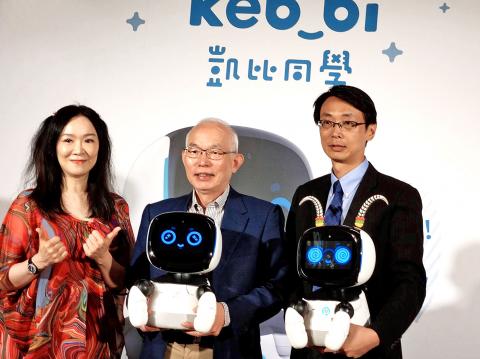Asia Pacific Telecom Co (亞太電信), a subsidiary of Hon Hai Precision Industry Co (鴻海精密), yesterday launched a new companion robot aimed primarily for children, targeting a market beyond commercial robots like Pepper.
The new “Kebbi” robot is manufactured by Hon Hai and designed by artificial intelligence (AI) robotics start-up Nuwa Robotics (Hong Kong) Ltd (女媧).
Hon Hai joined Nuwa’s second-round funding by investing US$35 million, giving it a 9 percent share of the start-up.

Photo: Wang Yi-hung, Taipei Times
The care-giving robot is able to play and chat with children, Nuwa said.
With a facial recognition feature, Kebbi can identify about 400 objects, the company said.
It can also be programmed to work as a tutor, helping young students and preschoolers study and practice English, it said.
“Some kindergartens have shown a strong interest in Kebbi. Local libraries are also keen on the robot and have ordered six,” Asia Pacific Telecom president Huang Nan-ren (黃南仁) told reporters at a media briefing in Taipei.
The company’s ultimate aim is to have a Kebbi robot in all Taiwanese households, Huang said.
Taiwan has about 7 million to 8 million households.
Pepper, the humanoid robot designed by Softbank Group Corp, targets the commercial market, Huang said.
It is designed to entertain people at commercial venues, such as shopping malls, banks and railway stations, rather than for households, he said.
With a price tag of NT$12,900, Kebbi robots will be available from Oct. 16, Asia Pacific Telecom said.
Mobile users can get the robot for NT$990 through a 30-month data service contract with Asia Pacific Telecom at a minimum fee of NT$996 a month.
Kebbi was launched in the Chinese market in the middle of June on the Web site of Xiaomi Corp (小米) under a different name, Nuwa founder and chief executive officer Leo Guo (郭柳宗) said.
It is called “Danny” in China, he said, adding that the company sold 1,000 Danny robots within 24 hours of the launch.
Xiaomi is one of the first angel investors in Nuwa, injecting 15 million yuan (US$2.18 million) in the start-up, Guo said.
Nuwa plans to start a third-round funding after raising US$12 million in the first and second rounds, he said.

CHIP RACE: Three years of overbroad export controls drove foreign competitors to pursue their own AI chips, and ‘cost US taxpayers billions of dollars,’ Nvidia said China has figured out the US strategy for allowing it to buy Nvidia Corp’s H200s and is rejecting the artificial intelligence (AI) chip in favor of domestically developed semiconductors, White House AI adviser David Sacks said, citing news reports. US President Donald Trump on Monday said that he would allow shipments of Nvidia’s H200 chips to China, part of an administration effort backed by Sacks to challenge Chinese tech champions such as Huawei Technologies Co (華為) by bringing US competition to their home market. On Friday, Sacks signaled that he was uncertain about whether that approach would work. “They’re rejecting our chips,” Sacks

NATIONAL SECURITY: Intel’s testing of ACM tools despite US government control ‘highlights egregious gaps in US technology protection policies,’ a former official said Chipmaker Intel Corp has tested chipmaking tools this year from a toolmaker with deep roots in China and two overseas units that were targeted by US sanctions, according to two sources with direct knowledge of the matter. Intel, which fended off calls for its CEO’s resignation from US President Donald Trump in August over his alleged ties to China, got the tools from ACM Research Inc, a Fremont, California-based producer of chipmaking equipment. Two of ACM’s units, based in Shanghai and South Korea, were among a number of firms barred last year from receiving US technology over claims they have

BARRIERS: Gudeng’s chairman said it was unlikely that the US could replicate Taiwan’s science parks in Arizona, given its strict immigration policies and cultural differences Gudeng Precision Industrial Co (家登), which supplies wafer pods to the world’s major semiconductor firms, yesterday said it is in no rush to set up production in the US due to high costs. The company supplies its customers through a warehouse in Arizona jointly operated by TSS Holdings Ltd (德鑫控股), a joint holding of Gudeng and 17 Taiwanese firms in the semiconductor supply chain, including specialty plastic compounds producer Nytex Composites Co (耐特) and automated material handling system supplier Symtek Automation Asia Co (迅得). While the company has long been exploring the feasibility of setting up production in the US to address

OPTION: Uber said it could provide higher pay for batch trips, if incentives for batching is not removed entirely, as the latter would force it to pass on the costs to consumers Uber Technologies Inc yesterday warned that proposed restrictions on batching orders and minimum wages could prompt a NT$20 delivery fee increase in Taiwan, as lower efficiency would drive up costs. Uber CEO Dara Khosrowshahi made the remarks yesterday during his visit to Taiwan. He is on a multileg trip to the region, which includes stops in South Korea and Japan. His visit coincided the release last month of the Ministry of Labor’s draft bill on the delivery sector, which aims to safeguard delivery workers’ rights and improve their welfare. The ministry set the minimum pay for local food delivery drivers at